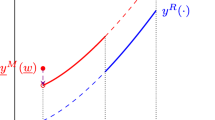Abstract
Intuitively, a voting rule satisfies the condition of positive association if it guarantees that an improvement for an alternative in the preferences expressed by voters results in a change, if there is any, of the social status of that alternative in the same direction. In this article, we consider two interpretations of this notion, and for parliamentary voting procedures, we provide results showing under the impartial anonymous culture (IAC) hypothesis how often the positive association is (not) satisfied. Furthermore, our analysis also permits us to investigate the relationships between these notions.
Similar content being viewed by others
References
Arrow KJ (1951) Social choice and individual values. Wiley, New York (second edition 1963)
Döring, H (eds) (1995) Parliaments and majority rule in western Europe. Campus Verlag, Frankfurt
Dummett M (1984) Voting procedures. Clarendon Press, Oxford
Favardin P, Lepelley D (2006) Some further results on the manipulability of social choice rules. Soc Choice Welf 26: 485–509
Gehrlein WV, Fishburn PC (1976) Condorcet’s paradox and anonymous preference profiles. Public Choice 26: 1–18
Huang HC, Chua V (2000) Analytical representation of probabilities under the IAC condition. Soc Choice Welf 17: 143–156
Maskin E (1985) The theory of implementation in Nash equilibrium: a survey. In: Hurwicz L et al (eds). Social goals and social organization: essays in memory of Elisha Pazner. Cambridge University Press, Cambridge
Muller E, Satterthwaite MA (1977) The equivalence of strong positive association and strategy-proofness. J Econ Theory 14: 412–418
Nurmi H (2002) Voting procedures under uncertainty. Springer, Berlin
Nurmi H (2005) A responsive voting system. Econ Gov 6: 63–74
Peleg B (1984) Game theoretic analysis of voting in committees. Cambridge University Press, Cambridge
Regenwetter M, Grofman B, Marley AAJ, Tsetlin IM (2006) Behavioral social choice: probabilistic models, statistical inference, and applications. Cambridge University Press, Cambridge
Sen AK (1970) Collective choice and social welfare. Holden-Day, San Francisco
Slutsky S (1979) Equilibrium under α-majority voting. Econometrica 47: 1113–1125
Wilson MC, Pritchard G (2007) Probability calculations under the IAC hypothesis. Math Soc Sci 54: 244–256
Author information
Authors and Affiliations
Corresponding author
Rights and permissions
About this article
Cite this article
Mbih, B., Moyouwou, I. & Zhao, X. On the positive association of parliamentary social choice functions. Soc Choice Welf 35, 107–127 (2010). https://doi.org/10.1007/s00355-009-0432-2
Received:
Accepted:
Published:
Issue Date:
DOI: https://doi.org/10.1007/s00355-009-0432-2




